#denys turner
Text
These two 'spiritualities' - of self-discovery and of self-making - possess, as it were, different moods.
In the one predominates the mood and the language of passivity, of calm certainty, an untroubled sense of everything having been in place all the time; it is a spirituality whose metaphors of spiritual progress are those of restoration of lines of continuity which in fact were never wholly severed, so that what is restored is the sense of how things truly are and always have been - indeed, in at least an implicit and inchoate sense, were always recognized to have been.
It is a spirituality in which sin and failure are represented as the rupture of the conscious, actively desiring and knowing self from its true relationship with its true centre, in which sin is the condition in which the conscious self is focused upon a point 'outside' that centre within, like an image in double focus.
It is therefore a characteristic of this spirituality of self-discovery that the goal of the spiritual life is reintegration, the readjustment of the image into single focus, the re-establishment of a unity, which sin has fractured, between conscious empirical selfhood and the pre-existing depths of one's being from which God can never be expelled.
The mood of the spirituality of self-making is, we might say, more 'existential'.
If the emphasis of self-discovery is on continuity, the emphasis of self-making is on breaks, crises and novelty; less on the Plotinian theme of the soul's return to its source, more on the soul's reaching out to that which is not yet; less on the domestic emotions of return to what is already, however dimly, known, more on the erotic passions of a yearning for the inaccessible.
And the narrative of the soul's progress in the spirituality of self-making is punctuated by crises of loss of the familiar and of startling encounters with the unexpected, for it is the spirituality less of memory as recollection than of memory as reconstruction, of memory constantly challenged to re-make the past in new terms and, as of the past, so of personal identity.
For the spirituality of self-discovery, I am what I was in my origins; for the spirituality of self-making, I am what I may hope for.
The Darkness of God
Denys Turner
#denys turner#augustine#theory#theology#philosophy#psychoanalysis#sort of#christianity#self making#self discovery
11 notes
·
View notes
Text

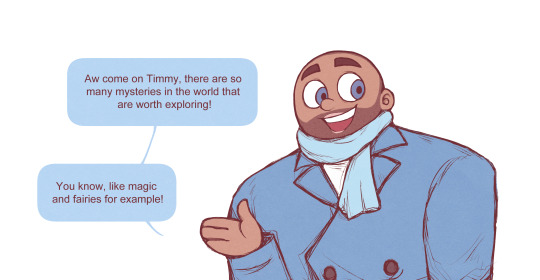

Bonus:
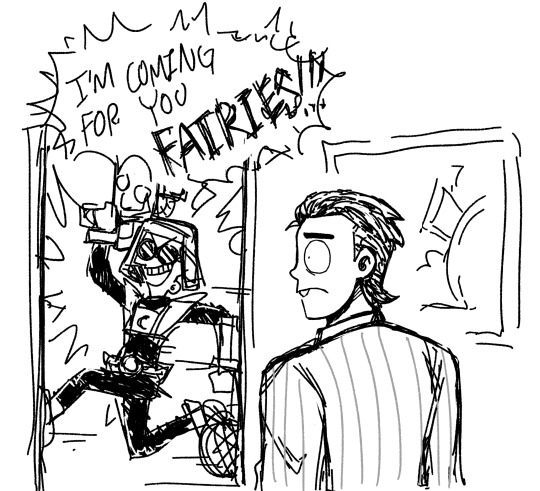

#fairly oddparents#fairly oddparents a new wish#fop a new wish#the fairly oddparents#timmy turner#denzel crocker#aj#fop aj#fop#a new wish#fairly odd parents a new wish#fairly odd parents#my art#fanart#I have plenty more ideas to draw for this au so hopefully I could get most of these done before my next semester starts#On one hand it's good that Timmy possibly didn’t become obsessed with finding his fairy godparents after witnessing firsthand what it did t#But at the same time it must sting for them to hear their former godkid outright deny your existence ngl#Also it's 5 am over here rn I really need to sleep oh god
3K notes
·
View notes
Text
























alex turner in a henley
#seemed like the folks wanted an 'alex in a henley' compilation#and who am i to deny people what they want?!#i was going to just do from sias cause that's the *true* alex turner bf core but then i was like fuck it. let's go through the years#i tried to get at least one of each kind of henley he wore over the years. but some are duplicates cause he looks so good.#i love how he wore that blue stripey one through fwn era to sias for a bit#it goes from 🥹 to 😳 real quick#the ‘flappy belt’ compilation is coming up next 🫡#alex turner#arctic monkeys#fwn era#humbug era#sias era#tbhc era#mine
89 notes
·
View notes
Photo







The most important thing is to have fun win.
#taissa turner#taissaturneredit#yellowjackets#yellowjacketsedit#yellowjacketsource#96yellowjackets#tvedit#*#yellowjacketsparallel#usercoty#im just thinking about her always#the fact that her dad is the kinda person to tell her 'just have fun!' about soccer (or anything) and yet -#that is not how she operates at all. it's 'the most important thing is to win'#she doesn't even deny it when she's called out on it she just deflects. she is so fascinating
286 notes
·
View notes
Text
Lottie kidnapping Nat so she can’t kill herself <3 Taissa saying Shauna’s poor and Natalie’s a drug addict <3 Shauna saying I would kill your spouses and actually I quite enjoy murder in general <3 Misty claiming she would NOT kill their spouses (she would) <3 Van judging like she’s not as fucked <3 NATALIE SAYING GUYS CAN WE JUST TALK PLEASE <3 lottie saying lol no talking actually my wellness cult is a sham your lives all suck kys <3
#help lmao#some of this content was my favorite part of the episode actually. people hated the confessions but I LOVED them#van throwing shauna’s keys. misty nat talking grave depth#tai trying to deny jessica roberts. shauna calling out Tai van. shauna loving murder#lottie cult leader playing appalled chefs kiss to me#but then the poison came out LMAOOO#anyway. I don’t fucking know lol i love natalie#yellowjackets#shauna shipman#taissa turner#natalie scatorccio#van palmer#misty quigley#lottie matthews
345 notes
·
View notes
Text
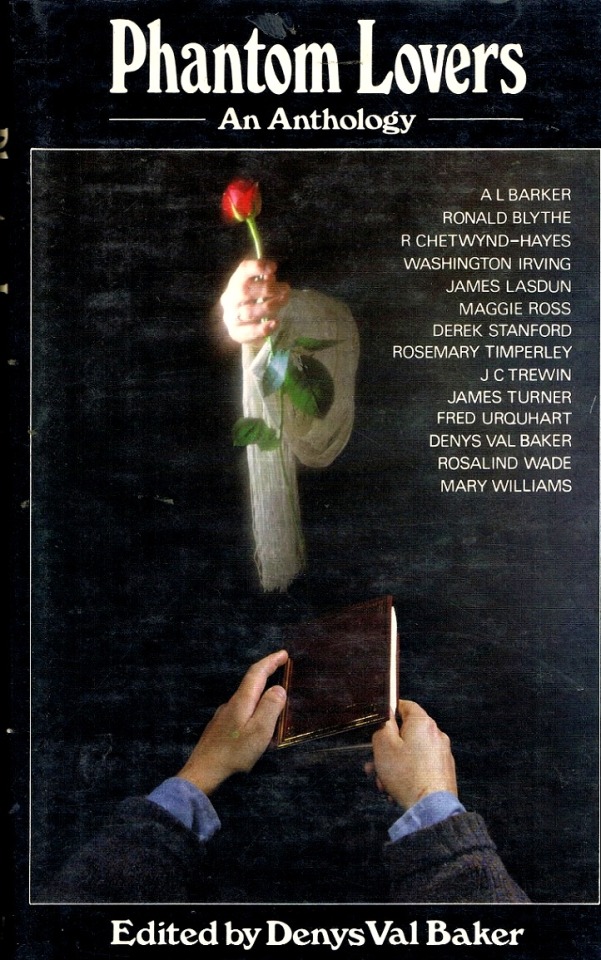
Denys Val Baker (editor) - Phantom Lovers - William Kimber - 1984
#witches#phantom lovers#occult#vintage#phantoms#lovers#william kimber#denys val baker#a.l. barker#ronald blythe#r. chetwynd-hayes#washington irving#james lasdun#maggie ross#derek stanford#rosemary timperley#j.c. trewin#james turner#fred urquhart#rosalind wade#mary williams#1984#anthology
32 notes
·
View notes
Text
Did someone say 90s Gay Club House music themed Clegan AU?
No? No one?
But I swear I heard something? 🤔
(it was me, I said it just then.... stay tuned)

#i want to write something which isnt fucking depressing god dammit#sometimes i read my own shit and im like good lord what is wrong with you#lighten up a bit#bloody hell#the mad max au was supposed to be fun#and tbf that was a miscalculation from the start#that is not a happy fun universe#tfw you try and write something 'fun' and the title of the first chapter is 'hope is a mistake'#very good sweetie youre doing very good#so i have been listening to my 90s rave piano and i am writing something colourful and fun if it kills me#also i am determined that this will be my first successful go at writing a one-shot#wish me luck babies 🙏#mota#clegan#john egan#bucky egan#gale cleven#buck cleven#callum turner#austin butler#me#hilly writes#i just think that bucky should be allowed to do a bit of cocaine#as a treat#you know he wants to#and who am i to deny him that?
10 notes
·
View notes
Text









LA TOURNEUSE DE PAGES (2006)
dir. Denis Dercourt
As a child, Mélanie shows great promise as a pianist. While auditioning for a music scholarship, one of the judges causes a disruption that throws off the girl’s playing and gets her rejected. She locks her piano and does not play again. As a grown woman, Mélanie will set in motion a long-awaited plan for revenge.
(link in title)
#la tourneuse de pages#the page turner#the page turner 2006#lgbt cinema#queer cinema#french cinema#lgbt#france#lesbian#bisexual#Denis Dercourt#déborah françois#catherine frot#french movie#french film#lgbt movie#lgbt film#2006#00s#2000s#00s movies#00s film#2000s films#2000s cinema#2000s movies#european cinema
13 notes
·
View notes
Note
How ‘bout 51 for taivan and 79 for tai & nat? Thanks, friend! :)
51 - Blessing/Good Luck Charm; 79 - High Five
Taissa's never been to the mall with just Natalie before now. It feels incredibly strange. They're not exactly hang-out buddies.
She'd normally have chosen another person entirely to ride on her handlebars, but that would sort of spoil the surprise. And, anyway, it's this person she trusts to help her pick out a present.
Weirdly, no one else in the world seems to know Van like Natalie Scatorccio.
"This?" She holds up a Hot Wheel. Natalie wrinkles her nose.
"You think Van's into cars?"
"It's a van," Taissa says witheringly. "It's a joke."
"Oh," says Natalie, "well, in that case--no, I'm fucking kidding, put that down."
Tai groans. "This is impossible."
Natalie has shot down absolutely everything. Socks. Stuffed toys. Pen knives, keychains, charm bracelets, necklaces. Everything Taissa has held up--patterned with dinosaurs, spaceships, movie characters, or soccer balls--Natalie has vetoed. So far, the only thing they can agree on is that the item has to be small enough to fit in Van's locker.
"A lucky rabbit's foot?" she wonders. "A pet rock? What stupid-ass thing am I supposed to be aiming for here?"
"We'll know it when we see it," Natalie says mysteriously, which only makes Taissa roll her eyes. The we in that sentence is doing a remarkable amount of heavy lifting, from her perspective. She'd wanted Natalie to help her, not fire missiles at her every idea.
Not the belt buckles. Not the mood rings. Not the tiny Star Wars Micro-Machines, nor the Pez containers. Nothing screams Van, no matter how much Taissa squints.
"This!" Natalie says at last. Taissa's jaw unhinges.
"No way."
"This," Natalie insists. "I'm telling you. It's perfect."
And--because Natalie didn't ask why Tai wanted so badly to buy Van a present before the season kick-off, because Natalie hasn't made fun of her once for doing this even though it's neither Christmas, nor Van's birthday--Taissa complies.
She doesn't know what to expect, presenting it to Van before their first game. Part of her considers giving up, keeping the item in the front pouch of her backpack for the rest of time--but, of course, there's Natalie. Bouncing on the balls of her feet. Rattling Taissa's shoulder with twitchy hands. She's all but hissing, Go on, give it to her in Tai's ear.
"This," Taissa says, "is from both of us."
Van raises her eyebrows. Out of the corner of her eye, Taissa sees Natalie do the same.
"It is?" they ask in eerie concert. Tai squares her shoulders.
"It's a good-luck charm." She resists the impulse to add, It was Natalie's idea. It's stupid. It's stupid, and therefore, I had nothing to do with it.
"We know you've got your ritual," she says instead. "And we figured, new year, new...add-on."
She dips her hand into the pouch, coming up with the small rectangle. Van looks perplexed.
"You got me a lighter?"
"A good-luck lighter," Natalie chimes in, which is great, because Taissa's half a second from dropping her head into her hands. "For burning the shit out of the competition."
Maybe, Taissa thinks, a fourteen-year-old was not the best person to invite to the mall after all. She should have gone with the mood ring. Or the Hot Wheel.
"This," says Van, her eyes shining, "is awesome."
She cracks open the lid, flicks the flint wheel. And, because Natalie helped Tai fill it in advance, a flame bursts to merry life.
"Awesome," Van breathes again. Tai winces.
"It is?"
"I told you," Natalie crows. She holds up a hand, slapping Taissa's palm so hard, the sting reverberates up her wrist. "Nobody else has a good-luck Zippo!"
That much is true. And nobody else gets the full force of Van's excited hug, the lighter still clutched in one fist as she flings her arms around Taissa in thanks.
That Zippo keeps Van company for the next four years. Before every game, Taissa watches her fish it out, flick it open, shut, open, shut. Three times, like clockwork, before flicking the flame to life. She watches Van shut her eyes, lips moving soundlessly--Tai can never make out what she's saying; it isn't for her, she recognizes--and then the lid slams shut. The fire doused, Van replaces the lighter on the top shelf, and goes out to absolutely dominate between the goal posts.
She'd be like that anyway, Taissa is sure. It's not the charm that does the trick. Van's excellent at what she does, the best goalie the city has seen in at least a decade. The lighter has nothing to do with it.
Still, every time, she meets Van's eyes and sees that flame reflecting back. Every time, Van grins. Raises the lighter a little higher in salute.
And, four years later, that lighter is in Van's pocket. When a plane goes down. When campfires need setting. When someone asks, "Who's got a light?" Everyone looks to Natalie, of course--and Natalie, obediently, flicks her Bic to life.
Only Taissa looks to Van. To the little silver rectangle tucked into the cup of Van's palm. Only Taissa sees it, and says nothing.
They could all use a little luck out here.
#fanfiction#ficlet#yellowjackets#yj fic#taivan#taissa turner#natalie scatorccio#van palmer#fic snippet meme#i hope your don't mind me doing a combo-pack#the idea was just too charming to deny#what a trio these three make
11 notes
·
View notes
Text
But where was this God who had been in his seeking?
In Augustine's interiority.
There Augustine had been unable to recognize God because he had been living foris, 'outside himself.
The God within had been beckoning him on, drawing Augustine within himself on an itinerarium intus - but inwards towards what?
Towards 'memory', to that most intimate part of himself, to that depth within himself in which it would be possible to recognize the God whom he could not possibly wholly 'forget'.
But in what sense of 'remember' does Augustine 'remember' God, however minimally, within the erratic and apparently random course of his journey within?
Augustine remembers God in the form of a restless dissatisfaction with all else that he seeks, a dissatisfaction which sharpens and intensifies as he draws ever nearer the goal of his seeking.
That dissatisfaction is a 'remembering' because it is at once a longing for what he lacks and a recognition of the failure to reach it, which implies at least negative knowledge of the true nature of the goal.
That remembering is at once a knowing and a not-knowing of God, a knowing, we might say, in the form of a not-knowing.
The Darkness of God
Denys Turner
#denys turner#darkness of god#philosophy#theory#theology#christianity#augustine#catholic#god is our true self#possibly
5 notes
·
View notes
Text
"LITTLE WOMEN" (1970) Review
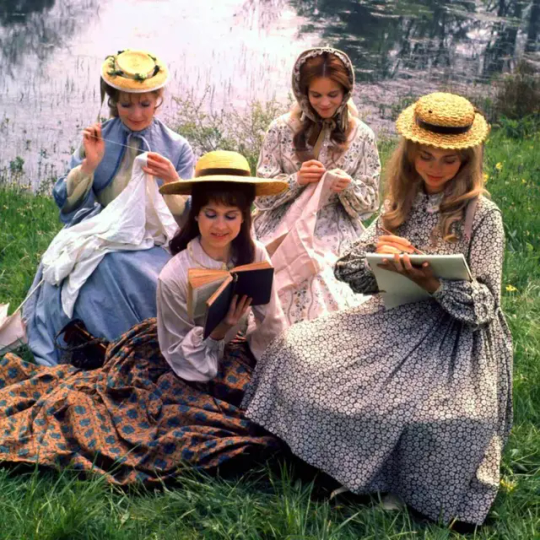
"LITTLE WOMEN" (1970) Review
It is very rare to find a British adaptation of an American novel. It is even rarer to find more than one adaptation. Louisa May Alcott's 1868 novel, "Little Women" must have been very popular with the BBC network. The latter had adapted the novel four times. Several years ago, I had seen the network's 2017 version. I thought it was the only version adapted by the BBC . . . until I had stumbled across the 1970 adaptation.
Set during the 1860s decade, "LITTLE WOMEN" told the story of the four March sisters of Concord, Massachusetts and their coming of age stories during and after the U.S. Civil War. With second daughter Josephine aka Jo serving as the story's main protagonist, the miniseries focused on the sisters' struggles with the family's diminished finances, their personal ambitions and especially their love lives. Early in the story, the March sisters become acquainted with their neighbor, one Theodore "Laurie" Lawrence, grandfather Mr. Lawrence and his tutor, John Brooke. Whereas third sister Beth develops a friendship with the elderly Mr. Lawrence, oldest sister Meg falls in love with Mr. Brooke, and the youngest Amy develops from a slightly vain and coddled child to a mature and self-assured young woman. As for Jo, the story focused on her development from a temperamental and stubborn girl, who learns to maintain her hot temper, navigate through her relationships with two men and adhere to her ambitions to become a writer.
Another surprising aspect of "LITTLE WOMEN" that I had learned was that it was the longest adaptation of Alcott's novel with a total running time of 225 minutes. This gave screenwriters Alistair Bell and Denis Constanduros to be as faithful to Alcott's novel as possible. Were they? Somewhat. The pair did take care to explore Laurie's volatile relationship with his grandfather - something that a good number of the other adaptations had failed to do. And it allowed glimpses into his growing relationship with Amy in Europe. Also, the early stages of Meg's marriage to Mr. Brooke ended up being explored, something that only the 2019 movie adaptation had repeated. I believe the miniseries did a very solid job of conveying these aspects of Alcott's novel.
But the miniseries left out Meg and Laurie's experiences at Annie Moffat's party. The miniseries also left out the sisters meeting with Laurie's English friends - something only the 2017 adaptation had included. Bell and Constanduros had changed the time period of Amy's near drowning at Walden Pond from the winter to either the spring or summer, allowing a rickety pier to send her into the pond, instead of thin ice. And it never touched on Amy's violent encounter with her schoolteacher over pickled limes. Did these aspects of the screenplay harm the production? Hmmmm . . . perhaps not. But I do feel that the miniseries' increased emphasis on the Lawrence men's relationship came dangerously close to overshadowing the March sisters' own relationships. I am relieved that the miniseries managed to focus somewhat on Jo's relationship with Professor Bhaer. However, I do have a problem with the sexist manner in which Constanduros and Bell had the professor viewed his future marriage to Jo. Whatever admiration Professor Bhaer had for Jo's writing skills seemed to fly out of the window in his anticipation of her being a good wife. Superficially, I had no problems with the brief focus on Meg and John's marriage, even if it could have been somewhat more thorough. But I believe it exposed what I believe was one of the miniseries' main problems.
"LITTLE WOMEN" did have its share of problems. Like the 1978 television adaptation, it is clear to see that it suffered somewhat from a low budget. If I must be frank, that seemed to be more obvious in this adaptation. Aside from Amy's near drowning at Walden Pond and some of European settings featuring Amy and Laurie, all other scenes had obviously been shot inside a studio. Very disappointing, considering a good number of BBC productions featured a mixture of interior and exterior shots. I found the actresses' makeup and hair - especially the latter - to be inconsistent and frankly, a big mess. Betty Aldiss' costume designs seemed solid enough, but not particularly earth shattering. Although the cast solely featured British performers, I believe a handful of them managed to handle American accents quite well - especially Stephen Turner, Stephanie Bidmead and Martin Jarvis. But despite their solid or excellent performances, the rest of the cast seemed to struggle maintaining one. And could someone please explain why three of the actresses who portrayed the March sisters seemed to be incredibly loud? Nearly every time one of them spoke, I had to turn down my television's volume. Some have explained these scenes featuring quarreling between the four sisters. They have even gone as far to claim this adaptation was the only one that featured the sisters often quarreling. Well, they would be wrong. Nearly every adaptation (I am not certain about the 1933 movie) of Alcott's novel featured quarrels between the sisters. So, this explanation does not strike me as a good excuse for the loud voices.
Judging from the previous paragraph, one would assume I have a low opinion of the majority of performances featured in "LITTLE WOMEN". Not really. Most of the performances featured in the miniseries struck me as pretty solid. Actresses Angela Down ("Jo"), Jo Rowbottom ("Meg"), Janina Faye (Amy) and Sarah Craze ("Beth") all gave solid performances and managed to capture the nuances of their individual characters in a competent manner. As I had stated earlier, I had a problem with most of them - with the exception of Craze - resorting to loud and histrionic voices in their portrayals of the March sisters at a younger age or in the case of Rowbottom, engaged in a heated quarrel. I thought Jean Anderson gave a solid performance as the stuffy Aunt March. Frederick Jaeger gave a very likeable performance as Jo's love interest, the intellectual Professor Friedrich Bhaer. And I believe the actor had a solid screen chemistry with Down. I really had a problem with actress Pat Nye, who portrayed the family's housekeeper, Hannah. Nye's handling of Hannah's American accent struck me as ridiculously exaggerated . . . to the point that her accent almost seemed Southern. Patrick Troughton, a talented actor in his own right, had more or less been wasted in his role as the family's patriarch, Mr. March. I do not believe he had spoken more than three to five lines in this production.
I can think of at least four performances that really impressed me. It seemed a pity that not one of them came from the four actresses who portrayed the sisters. Oh well. John Welsh has my vote as the second best version of Mr. James Lawrence, the March family's wealthy neighbor. I thought he did an excellent job of developing his character from a strict and curmudgeon guardian to a warm-hearted man who learned to develop a relationship with his grandson. Most portrayals of John Brooke, Meg's future husband, have never impressed me. But I must say that I found Martin Jarvis's portrayal of the character more than impressive. The actor was given an opportunity to delve more into Mr. Brooke's personality and he ended up giving one of the better performances in the miniseries. If given the chance to vote for the best performance in "LITTLE WOMEN", I would give it to Stephen Turner for his portrayal of the sisters' close friend, Theodore "Laurie" Lawrence. I suspect Turner had greatly benefited from Bell and Constanduros's script, which seemed more interested in Laurie as a character than the four leads. But judging from Turner's performance, I suspect his would have overshadowed everyone else's due to the actor's superb handling of the character. I also have to compliment Stephanie Bidmead's portrayal of the March family's matriarch, Mrs. "Marmee" March. Not only did I find her performance warm and elegant, but it also lacked the dripping sentimentality of the earlier versions and the heavy-handed attempts to make the character "modern" - relevant to today's movie and television audiences.
"LITTLE WOMEN" had its flaws. I cannot deny this. But I feel its flaws - which included a limited budget and some questionable American accents - were not enough to dismiss the nine-part miniseries as unworthy. I believe the 1970 miniseries proved to be a lot more solid and entertaining than some fans of Alcott's novel believed, thanks to Paddy Russell's competent direction, a damn good screenplay by Denis Constanduros and Alistair Bell, and a first-rate cast led by Angela Down.
#costume drama#period drama#period dramas#little women#little women 1970#louisa may alcott#little women bbc#jo march#angela down#meg march#jo rowbottom#janina faye#amy march#sarah craze#beth march#stephanie bidmead#stephen turner#martin jarvis#frederick jaeger#patrick troughton#pat nye#u.s. civil war#john welsh#paddy russell#denis constanduros#alistair bell
8 notes
·
View notes
Text

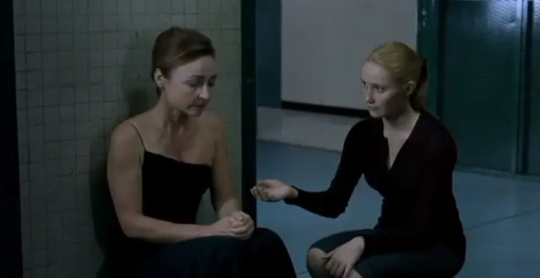

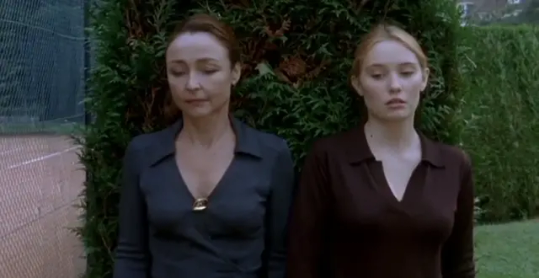
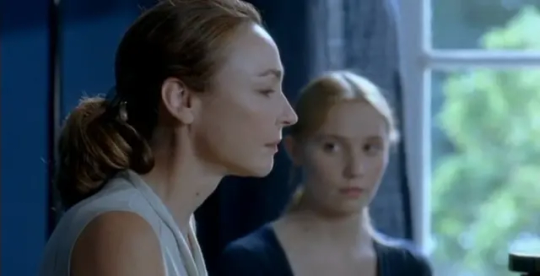
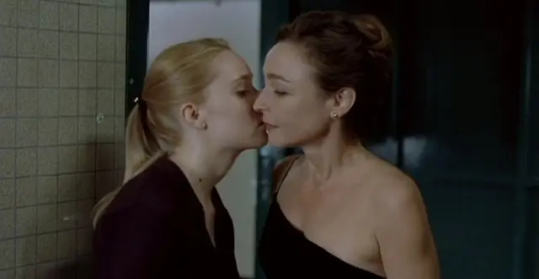

la tourneuse de pages (2006) dir. denis dercourt
#la tourneuse de pages#the page turner#wlw#catherine frot#déborah françois#denis dercourt#french cinema#2000s#age difference
21 notes
·
View notes
Text
ik we've said it on here before but it really is Something how anyone alex turner works with/gets interviewed by falls madly horribly indelibly foreverably in love with him. like me too. hes just that kinda guy aint he
8 notes
·
View notes
Text
THIS IS WILD I KNOW HANG IN THERE WITH ME Okay okay okay once again saying more on this later but word vomiting the thoughts out after seeing the vanity fair article saying that jackie might be antler queen…because it’s making some kind of sense.
Twelve of them took part in the eating, body as communion, recreation of religion which we’ve been waiting for as a theme and the show runners have heavily discussed (burning of a body as standard ritual sacrifice), shauna/lottie/tai prophets with different reactions to their prophecy which is also common in early religious accounts, travis and van early believers and proselytizers, Laura Lee angel perhaps??, if game comes shortly after Jackie’s burning (which is a long standing theory from a lot of people and one I tend to believe—that they eat one girl but the rest are sacrificial to bring game and other prosper etc), the necklace as idolatry almost?, an Abraham Isaac moment I’ve ALSO been waiting for (as have others, aka shauna killing that baby or showing a willingness to kill that baby For Jackie), SHAUNA’S JOURNALS AS HOLY TEXT HI??? Like it DOES make sense that after abruptly doing this taboo and horrific thing they would NEED to believe that Jackie Truly Did That For Them to cope. It would make sense as an opening point for a new religion—followers desperate for not only survival and sense-making but salvation. Who better to grant you salvation than the girl you transgressed??
(I talked a big talk about boring and predictable as my initial impression and it’s very possible it stays that way, but if they make Jackie Taylor a fucking god I’ll gladly eat those words because that’s some fucking genius.)
#just a THOUGHT my clown shoes are BEYOND READY but IMAGINE okay??#like that would sure be a fucking twist you can’t deny it#yellowjackets#yellowjackets theories#jackie taylor#shauna shipman#lottie matthews#taissa turner#van palmer#misty quigley#natalie scatorccio
270 notes
·
View notes
Note
i can't express how much i wanna be wrecked by osamu ANDD SUNA AT THE SAME TIME IT IS A NEED
KJEKJEJKRJEKRJKEKJRJKEJR
#squiggiy speaks#rintarousbestiekxrma#friend :3#If that's not a mood oh my god XD#thank you for sharing friend akjlrekjarjkeajkraejkr#They would make quite the duo I can't deny!#suna rintarou#osamu miya#As a fellow Suna lover- I feel ya!#Not so much for Osamu won't lie#No hate to him just not my personal cup of tea kjarkaerkjaejkr#He kinda looks like Timmy Turner and it throws me off lols
6 notes
·
View notes
Text
Okay so I'm watching AM at King's Theatre again and for some reason I started wondering what the boys smell like. So here's my list:
Jamie: expensive cologne and leather, very crisp and rich
Nick: low-key scented and understated and warm and cosy
Matt: probably some intense deodorant with a more sporty/musky tone
Al: clean laundry and a hint of leather and coffee, but defo just like...clean and warm
Feel free to add your own!
#random#random thoughts#why does my brain do this#can anybody confirm or deny this?#alex turner#nick omalley#matt helders#jamie cook#arctic monkeys#am vibes#smells are the best
4 notes
·
View notes